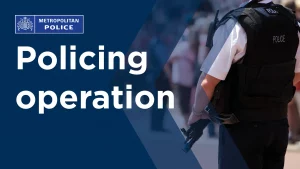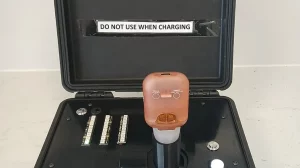POLICE TARGET THAMES PARTY BOATS TO BEAT SPIKING

The Metropolitan Police Service is intensifying its efforts to tackle spiking across London, with operations targeting party boats on the River Thames as well as bars, clubs including the use of new vape-spiking equipment.
This technology, which has already been used in night clubs, festivals, concerts and schools, allows rapid testing of vapes suspected to contain drugs such as THC or Spice.
This is a growing concern for police after reports of vapes being tampered with, often shared between young people or handed out in social settings. In some cases, use of a spiked vape has led to hospitalisation.
Alongside this, the Met is assessing a range of different mobile drug testing equipment, which assist rapid drug identification – including near infra-red detectors that can quickly test a wide range of powders and tablets suspected of containing controlled drugs, supported by a mobile phone app.

This is part of the Met’s improved approach to tackling violence against women and girls (VAWG) by using innovative technologies and tactics to secure justice for victims.
Innovation is improving outcomes for victims and making London safer for women and girls, with the charge rate for VAWG offences tripling in the last three years.
Spiking, where substances are surreptitiously introduced into someone’s drink, food, vape or body without consent is a premeditated and invasive crime.
Between March 2024 and March 2025, the Met received over 2,000 allegations of spiking, around 150 every month – though the true scale of the crime is believed to be higher due to underreporting.
The crime disproportionately affects women and girls, with 66% of victims in August 2025 being female.
Offenders are most active in and around busy nightlife venues, with 17% of reports linked to Westminster and the West End.
The Met’s Marine Support Unit is leading Operation Albenga, working in collaboration with the Met’s licensing teams, drugs dogs, safer transport, and central Violence Against Women and Girls (VAWG) team.
The operation focuses on party boats along the Thames, which are popular with students during Freshers’ Week.
As a frontline policing unit, the Marine Support Unit are responsible for policing 47 miles of the River Thames, alongside any further waterways and bodies of water across London.
Throughout Operation Albenga, the unit has been proactively patrolling party boats embarking and disembarking at Westminster Pier to identify and prevent offending taking place on the river.
Officers are conducting safety checks, engaging with partygoers, and using specialist vape spiking detection equipment – unique technology that enables rapid testing of vapes suspected to contain drugs. This is part of a wider toolkit officers are trialing, including early evidence kits for drink and drug testing.
Deputy Assistant Commissioner at the Metropolitan Police, Ben Russell, said: “Spiking is an abhorrent crime that we are tackling head on, whether it takes place in a nightclub, a private venue, or on the Thames.
“The ongoing trial of new vape spiking detection kits is just one example of how we are innovating to get ahead of offenders and better protect the public.
“This is part of our wider commitment under the VAWG strategy to protect women and girls across London.
“We are working with partners in licensing, education and the night-time economy to disrupt offenders, raise awareness and, crucially, support victims.
“If you think you’ve been spiked, please come forward -being spiked is never your fault – it’s always the fault of the perpetrator.
“The sooner we know, the more we can do to support you, collect evidence and stop dangerous offenders from targeting others.”
Minister for Safeguarding and Violence Against Women and Girls, Jess Phillips said: “As students across the country enjoy Freshers Week, we are determined to tackle the vile crime of spiking.
“That’s why we are funding a national Spiking Intensification Week to raise awareness, support police forces to use innovative tactics, and encourage victims to report this crime.
“We are also working with bars, pubs and clubs to roll out specialist training for staff and introducing a new criminal offence for spiking to bring more perpetrators to justice.”
Eren Bessim, Training and Development Manager at Safer Business Network, said: “We know spiking remains a concern for many people, particularly students and young people returning to the city this autumn.
“By working in partnership with the MPS, local authorities, and venues, we are equipping frontline teams with the confidence and knowledge they need to prevent and respond to incidents of vulnerability — making London’s day and nightlife safer and more welcoming for everyone.”
CEO of White Ribbon UK Lynne Elliot, said: “Spiking is a serious crime that has been found to disproportionately affect women and girls. We need to create a culture where it’s the norm for men to speak up against spiking and the harmful behaviours that can lead to it. It’s not just something that happens on a night out, it’s part of a bigger problem of behaviours that lead to violence against women and girls. Prevention starts with men speaking up against harmful behaviours before they escalate.”
Sharon Gaffka, said: “Being spiked is a life-altering experience. Having your autonomy and memory taken from you is utterly devastating. It is an abhorrent crime that can happen to anyone, of any age, in any setting. The fact that it disproportionately affects women at the hands of men underlines that this is about power, dominance and the attempt to push women out of public life.
“As a survivor, one of the hardest things I faced was the lack of co-ordination between emergency services in the immediate aftermath.
“That’s why I welcome the Met’s commitment to strengthening its approach across London’s nighttime economy.
“From my experience working alongside Thames Valley Police on Project Vigilant, I know that proactive policing is the biggest deterrent and I’m encouraged to see further steps being taken to protect people on nights out, whether in clubs, bars or on the capital’s party boats.”
CEO of Night Time Industries Association, Michael Kill, said: “We welcome the Metropolitan Police Service’s intensified efforts to tackle spiking across London. The introduction of innovative technologies, such as vape spiking detection kits and rapid drug testing equipment, is a significant step forward in protecting patrons across the capital.
One of the key drivers for people going out more is for them to feel safe, and this is particularly important for women who go out at night. Spiking is a deliberate, perpetrator-driven crime that directly undermines that sense of safety. By focusing on identifying offenders and using evidence-led tactics, the police are sending a clear message that such heinous behaviour will not be tolerated.
The Night Time Industries Association fully supports initiatives that equip venues, staff, and police with the tools to prevent and respond to these crimes. Collaboration between the police, night-time economy, and community partners is essential to creating safer environments, ensuring victims are supported, and driving perpetrators to justice.
We remain committed to working alongside the police and industry partners to embed these approaches across London’s nightlife, ensuring innovation continues to protect the safety of all who enjoy the city after dark.”
Throughout the operation the Met’s VAWG team has been supported by Project Vigilant – uniform and non-uniform officers who proactively patrolled the nearby area to identify potential offenders.
Over 400 Met officers have been trained in techniques to spot predatory behavior in public spaces over the last two years.
Alongside the Thames operation, the Met continues to work in partnership with bars, clubs, and venues across London as part of its night-time economy policing plan. Licensing officers and neighbourhood teams are carrying out proactive visits, while the Met’s partnership with the Safer Business Network has already delivered WAVE (Welfare and Vulnerability Engagement) training to more than 850 venues.
The Met also works closely with charities such as Drinkaware, providing staff with the tools to spot predatory behaviour and how to respond quickly if a customer reports being spiked.
These efforts follow Spiking Intensification Week, a national initiative led by the NPCC and Home Office. Across London, local policing teams are delivering engagement, training, and disruption activity, with a strong emphasis on protecting young people as they begin university life.
If you believe you have been a victim of spiking, please come forward and get the support you are entitled to from our specially trained officers.
Anyone who is a victim of spiking, or knows someone that has been, should report it to police straightaway to give the best chances of capturing evidential opportunities.
If a crime is in progress call 999, otherwise victims can report a recent or non-recent case of spiking here – How to report spiking to the police | Metropolitan Policeor call 111.
The Met is using a number of tactics including an innovative V100 programme to improve the response to VAWG. They have also rolled out training to 20,000 frontline officers and added 565 specially trained officers and staff into teams tackling VAWG which has doubled charges for rape since 2022 and secured 389 Stalking Protection Orders.








